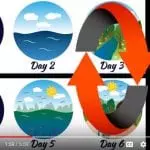[Originally published as Don’t Fear “the Reaper”: Why Young Earth Creationists Can—and Should—Embrace the Ancient Near-Eastern Background of the Bible]
Due to what I consider to be a misuse of ancient Near-Eastern (ANE) backgrounds among evangelical scholars in recent years, many young age creationists have steered clear of broaching this topic.
This, I believe, is an error.
The Problem, Explained
So the first issue is this: Some scholars and a great deal more popularizers are advancing the idea that the historical background of the biblical writers has so much of an effect on the text that, in some cases, it can mean nearly anything we want it to with respect to certain issues.
Broadly (and doctrinally) speaking, this could come to bear on things like:
- The nature, length, and order of creation.
- The real meaning of redemption.
- Death before sin.
- The limits of accommodation.
- Biblical inerrancy.
And there’s probably a few more I’ve left out.
However, there’s a second issue: On the other end, this ignorance has led many to almost completely write off ANE associations between Israel and her neighbors. And I’d only be honest in admitting that, at times, I’ve been guilty of this.
The danger is that this thinking robs the modern reader of understanding the world in which the ancient writer found himself.
This may not sound that important to you, but it should. Young age creationists are (rightly) obsessed with making sure the Bible’s historical claims are taken seriously. But how can we understand what those claims are without understanding the biblical worldview?
For me personally, two examples have made this clear.
Understanding Polemical Theology has helped me to make sense of some very confusing passages of Scripture. The shame is that for so long I’ve missed how theologically rich these passages are, now that I have this framework of thought in my toolbelt!
The second of these would be Michael Heiser’s Divine Council Worldview. Although not new to Heiser, he is best known for popularizing it. The view basically expands on the nature of the battle going on in God’s world—it is much more spiritual than most Christians—especially Westerners—are willing to make it.
A Healthy Move
With that said, I was really excited to see an article pop up in my feed that was written by Shane Doyle over at Creation Ministries International (CMI), entitled Ancient cosmology and the timescale of Genesis 1.
Here is the provided synopsis of the article:
Long-age interpreters often argue that the supposed ‘ancient cosmology’ of Genesis 1 implies that its seven-day timespan is incidental to the main point of the passage. This overreads the cosmological statements of Genesis 1, but it also does not follow; just because one ‘challenging’ element of a narrative passage may be incidental does not imply that all its ‘challenging’ elements are. Nor is there enough evidence to show that Genesis 1 derives its seven-day schema from any previously existing biblical or Ancient Near Eastern pattern. The Ancient Near Eastern context does not justify a rejection of the traditional ‘historical week’ reading of Genesis 1.
I liked this article for two reasons:
First, I read only one line that contained the sort of derogatory language I am usually critical of CMI for using, and it was actually not that bad. So, Kudos! I really liked this writer.
The second is that this writer not only responded to the claim above but was not dismissive of the importance of understanding ancient things with respect to understanding the Bible.
I would like to see more of this approach by popularizers of creationism. It’s the balance between being totally dismissive because we disagree with what we believe to be some unjustified conclusions/over-readings, and allowing an ancient worldview to properly inform our understanding of the text.
Therefore, rather than to be afraid of this thinking, we should think of it as an ally.
Scholarship can help us to do that.
A Nod to the Scholars
There are lots of Hebrew/Old Testament scholars who are well aware of and give proper place to ANE backgrounds and the biblical text, but don’t allow the text to improperly inform the doctrines listed above.
Without thinking hard, I can think of at least six or seven, most of whom are openly-affirming young age creationists.
There are two, though, I’d love to highlight: John Currid and David Fouts.
I picked these two for a reason. They each are known for their contribution to biblical historical backgrounds and yet remain committed young age creationists.
The former is well known for both scholarly and popular level works in Polemical Theology, discussed above. This is important because many passages seem to be robbed of their historical value by popularizers who take the text to have only a polemical meaning.
The latter is well known, among other things, for his demonstration that the Old Testament often uses inflated numbers in order to make a theological point. This is important because arguments like his are often used to show that the genealogies of Genesis 5 and 11 ought not to be taken literally. He obviously to some extent disagrees.1
In Conclusion
In my opinion, therefore, we should embrace what scholars have to say about ANE backgrounds as it relates to the writing of the Old Testament.
As with any idea we read or hear, we should keep our wits about us. I may disagree with some conclusions and interpretations of data that mainstream scientists put forth, but that in no way means I don’t value science or the methods that lie beneath it.
We should approach these conversations willing to be nuanced in the details. We don’t have to accept “that scholar said it, so it is fact.” Neither do we have to say, “that scholar said it, it must be wrong.”
To approach information this way is to be sorely misguided, and to rob God of the context in which he chose to reveal himself to us.
This, friends, would be a grave error.
Footnotes
- I have not yet seen a specific argument from him regarding these genealogies, so I want to avoid putting words in his mouth. I’m simply making the point that this author must not think his own arguments undermine young age creationism in that way, given the relatively recent book he has written urging modern scholars and leaders to take the traditional Calendar-Day interpretation of Genesis.







